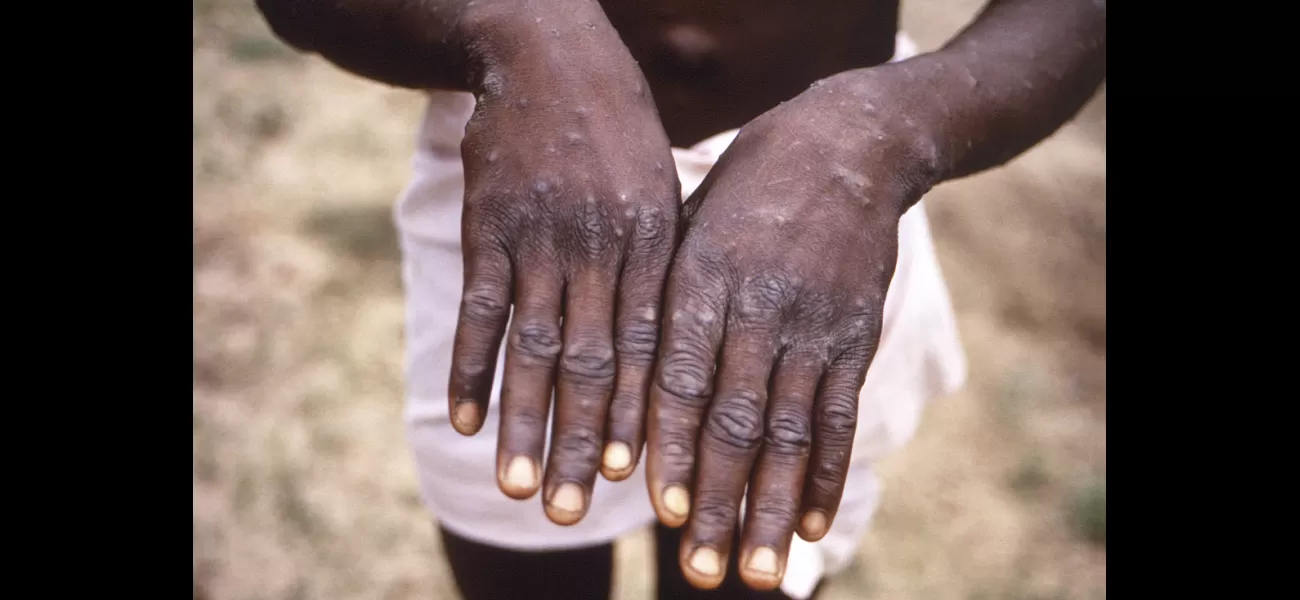What is mpox and how can it be prevented?
Experts worried about new, highly contagious version of disease. Stay informed.
August 16th 2024.

The recent announcement from the World Health Organization has sent shockwaves throughout the world as they declared the escalating spread of mpox in Africa to be a global health emergency. Just 24 hours later, confirmation came that the virus had crossed international borders, causing even more concern among health officials.
According to Swedish health officials, the first case of the highly infectious form of mpox, which was initially seen in eastern Congo, has been identified. This news comes as WHO reports that Africa has already recorded over 14,000 cases and 524 deaths this year, surpassing last year's figures.
The severity of the situation has been highlighted by the recent deaths of hundreds of children in this new wave of mpox. Scientists are particularly concerned about the spread of a new strain of the virus in Congo, which may be more easily transmitted among people.
To better understand the situation, let's take a closer look at what mpox is and how it can be contained. Mpox, also known as monkeypox, was first identified in 1958 during outbreaks in monkeys. Although most human cases were previously seen in central and West Africa, it has recently spread to more than 70 countries worldwide, including through sexual contact.
While it belongs to the same family of viruses as smallpox, mpox causes milder symptoms such as fever, chills, and body aches. However, in more severe cases, people may develop lesions on their face, hands, chest, and genitals.
The sudden spike in cases in Africa has raised concerns among health officials. The Africa Centres for Disease Control and Prevention has reported that mpox has now been detected in at least 13 African countries, with a 160% increase in cases and a 19% increase in deaths compared to last year. Furthermore, a new, more dangerous form of the virus has emerged in a Congolese mining town, resulting in up to 10% mortality rate.
Unlike previous outbreaks where lesions were mostly seen on the chest, hands, and feet, this new strain of mpox causes milder symptoms and lesions on the genitals. This makes it harder to detect, potentially leading to the virus spreading unknowingly through sexual contact.
With the recent identification of mpox in four East African countries, WHO has expressed concern about its further spread within and beyond the continent. The Ivory Coast and South Africa have also reported outbreaks, but these are of a less dangerous version of the virus seen during the global outbreak in 2022.
The emergency declaration by WHO has been made in hopes of mobilizing resources and aid from donor agencies and countries. However, the response to previous declarations has been mixed, and Africa CDC Director General Jean Kaseya has appealed to international partners for help. He also highlighted the urgency of the situation, saying that the escalating caseload in Africa has largely been ignored.
The current outbreak of mpox is different from the one seen in 2022, where gay and bisexual men made up the majority of cases and the virus was mostly spread through close contact. However, in Africa, children under 15 account for over 70% of cases and 85% of deaths in Congo.
As WHO and other organizations work to contain the spread of mpox, it is essential to understand what measures can be taken. Tedros, the director-general of WHO, has stated that a tailored and comprehensive response is necessary to stop these outbreaks. Save the Children's Congo director, Greg Ramm, has expressed concern about the virus spreading in overcrowded refugee camps, where 345,000 children are living in unsanitary conditions.
Experts are still unsure why children are disproportionately affected by mpox in Congo. It could be because they are more susceptible to the virus or due to social factors such as overcrowding and exposure to infected parents.
To stop the spread of mpox, immunization is crucial. However, this has been difficult in Africa, as barely any vaccines or treatments are available. Marks, a professor of medicine at the London School of Hygiene and Tropical Medicine, suggests that inoculating people against smallpox, a related virus, may help.
Congo has already begun talks with donors for possible vaccine donations and has received financial aid from countries like Britain and the US. WHO has also released funds from its emergency fund, but more resources are needed to effectively respond to the outbreak.
In light of this emergency, we urge everyone to stay informed and take necessary precautions to stay safe. Let's all work together to contain the spread of mpox and protect our communities.
According to Swedish health officials, the first case of the highly infectious form of mpox, which was initially seen in eastern Congo, has been identified. This news comes as WHO reports that Africa has already recorded over 14,000 cases and 524 deaths this year, surpassing last year's figures.
The severity of the situation has been highlighted by the recent deaths of hundreds of children in this new wave of mpox. Scientists are particularly concerned about the spread of a new strain of the virus in Congo, which may be more easily transmitted among people.
To better understand the situation, let's take a closer look at what mpox is and how it can be contained. Mpox, also known as monkeypox, was first identified in 1958 during outbreaks in monkeys. Although most human cases were previously seen in central and West Africa, it has recently spread to more than 70 countries worldwide, including through sexual contact.
While it belongs to the same family of viruses as smallpox, mpox causes milder symptoms such as fever, chills, and body aches. However, in more severe cases, people may develop lesions on their face, hands, chest, and genitals.
The sudden spike in cases in Africa has raised concerns among health officials. The Africa Centres for Disease Control and Prevention has reported that mpox has now been detected in at least 13 African countries, with a 160% increase in cases and a 19% increase in deaths compared to last year. Furthermore, a new, more dangerous form of the virus has emerged in a Congolese mining town, resulting in up to 10% mortality rate.
Unlike previous outbreaks where lesions were mostly seen on the chest, hands, and feet, this new strain of mpox causes milder symptoms and lesions on the genitals. This makes it harder to detect, potentially leading to the virus spreading unknowingly through sexual contact.
With the recent identification of mpox in four East African countries, WHO has expressed concern about its further spread within and beyond the continent. The Ivory Coast and South Africa have also reported outbreaks, but these are of a less dangerous version of the virus seen during the global outbreak in 2022.
The emergency declaration by WHO has been made in hopes of mobilizing resources and aid from donor agencies and countries. However, the response to previous declarations has been mixed, and Africa CDC Director General Jean Kaseya has appealed to international partners for help. He also highlighted the urgency of the situation, saying that the escalating caseload in Africa has largely been ignored.
The current outbreak of mpox is different from the one seen in 2022, where gay and bisexual men made up the majority of cases and the virus was mostly spread through close contact. However, in Africa, children under 15 account for over 70% of cases and 85% of deaths in Congo.
As WHO and other organizations work to contain the spread of mpox, it is essential to understand what measures can be taken. Tedros, the director-general of WHO, has stated that a tailored and comprehensive response is necessary to stop these outbreaks. Save the Children's Congo director, Greg Ramm, has expressed concern about the virus spreading in overcrowded refugee camps, where 345,000 children are living in unsanitary conditions.
Experts are still unsure why children are disproportionately affected by mpox in Congo. It could be because they are more susceptible to the virus or due to social factors such as overcrowding and exposure to infected parents.
To stop the spread of mpox, immunization is crucial. However, this has been difficult in Africa, as barely any vaccines or treatments are available. Marks, a professor of medicine at the London School of Hygiene and Tropical Medicine, suggests that inoculating people against smallpox, a related virus, may help.
Congo has already begun talks with donors for possible vaccine donations and has received financial aid from countries like Britain and the US. WHO has also released funds from its emergency fund, but more resources are needed to effectively respond to the outbreak.
In light of this emergency, we urge everyone to stay informed and take necessary precautions to stay safe. Let's all work together to contain the spread of mpox and protect our communities.
[This article has been trending online recently and has been generated with AI. Your feed is customized.]
[Generative AI is experimental.]
0
0
Submit Comment





